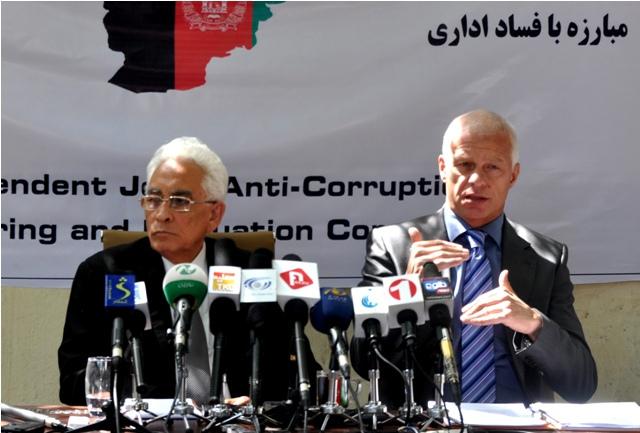KABUL): The Monitoring and Evaluation Committee (MEC), accusing the United Nations Development Programme (UNDP) of opposing its creation, on Tuesday assailed the High Office of Oversight and Anti-Corruption (HOOAC) for refusing to cooperate with it.
Last year, the government asked the international community to form an Afghan and International Monitoring and Evaluation Committee (MEC) to offer policy advice and monitor progress against specific benchmarks.
The invitation from the government was welcomed by the international community at the London Conference. The watchdog has three Afghan and as many foreigner members.
MEC head, Mohammad Yasin Usmani, told a news conference in Kabul: “The UNDP didn’t want MEC to be set up; we know there is corruption in the UN agency. Also, the HOOAC is not cooperating with us.”
Despite efforts, UNDP officials could not be reached for comment on the allegation from MEC, which recently started operating and its members meet every three months to monitor anti-corruption efforts by the government and private organisations.
Every six months, the committee has to submit its report to the Presidential Palace, parliament, the international fraternity and the people of Afghanistan. MEC had twice shared its suggestions with the government and non-governmental organisations.
MEC member Drago Kos said the implementation of recommendations sent for the first time to relevant government departments and NGOs was low because they had little familiarity with the body.
Of the latest recommendations, he said, 12.9 percent were fully implemented and 48.4 partially enforced, while 38.7 percent remained untouched. Of the proposals floated six months ago, 33.3 percent were fully enforced and 50 percent partially implemented. The remaining 16.7 percent remained unimplemented.
Osmani said reduction in government departments’ expenses, transparency in mining contracts, amendments to some laws, reforms in procurement at domestic and donors’ level and simplification of services provided to the people were part of the main recommendations.
He said the committee had set in motion the process of simplification of procedures in some places, like the traffic department, to prevent corruption. The effort has yielded positive results, Osmani concluded.
Mm/mud
Visits: 3









GET IN TOUCH
NEWSLETTER
SUGGEST A STORY
PAJHWOK MOBILE APP